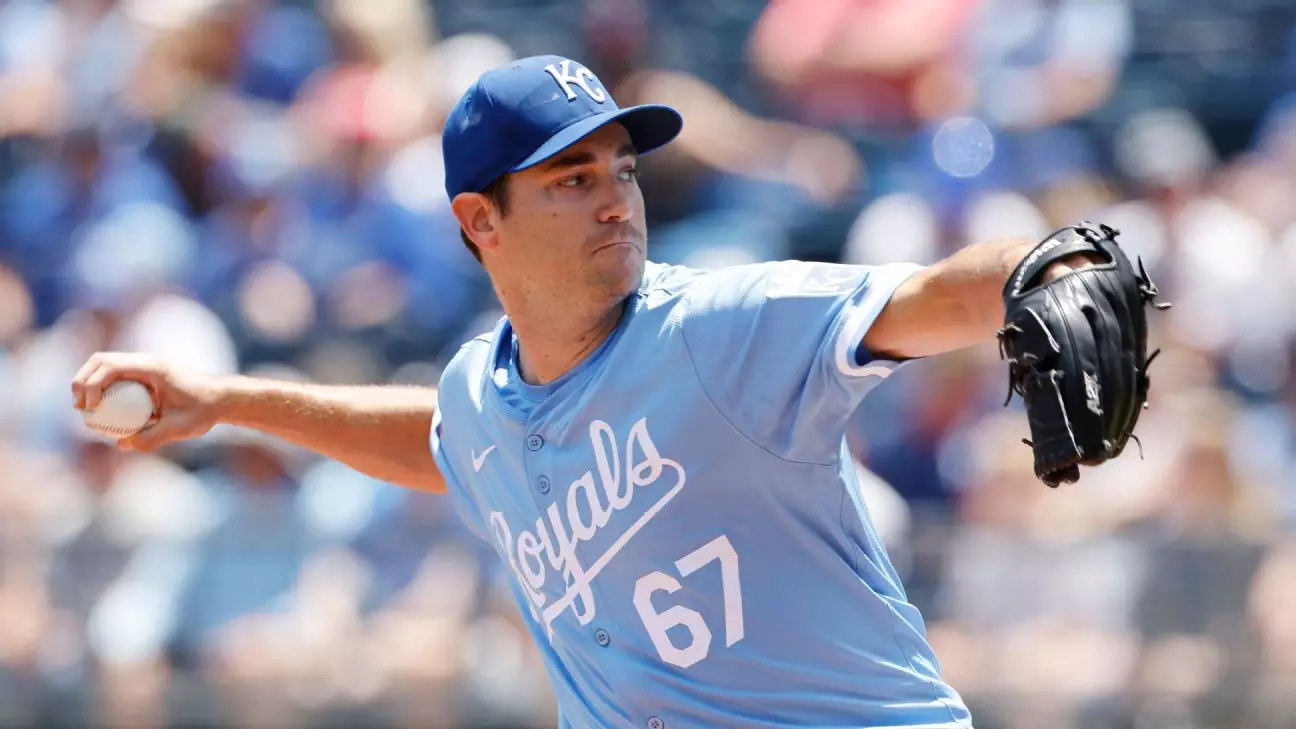The Kansas City Royals’ recent victory against the Chicago Cubs exemplifies a team fueled by determination and a refusal to be solely dictated by circumstances beyond their control. Their 8-4 win wasn’t just a stat sheet achievement; it was a testament to their resilience and collective spirit. Central to this narrative is Vinnie Pasquantino’s emphatic rallying cry for teammate Seth Lugo, echoing a deeper desire to retain loyal talent amid a season marked by ambiguity and potential upheaval. The undercurrent here is clear: loyalty and stability matter profoundly in a sport rife with transactional energy and business considerations.
Lugo’s performance—delivering six effective innings in sweltering heat—highlighted his importance. Yet, with his impending free agency, questions swirl about whether the Royals can keep hold of him. Pasquantino’s gestures reflect a heartfelt hope, a belief that personal affection and team loyalty can influence front office decisions, even if baseball’s transactional nature often overrules sentiment. This scenario raises a larger issue: can a team like Kansas City truly cultivate loyalty in an era where player movement is almost inevitable? Or is loyalty merely a noble ideal amidst the lucrative and pragmatic landscape of Major League Baseball?
The Market Forces at Play
The impending trade deadline adds palpable tension. The Royals are battling to stay afloat, and Lugo looms as a valuable asset for teams seeking pitching reinforcements. His stellar 2.95 ERA and consistent performance over recent starts make him an attractive commodity, particularly as the July 31 deadline approaches. Yet, here’s where the balance between short-term survival and long-term loyalty becomes murky. Will Kansas City prioritize market value, or will they opt to retain their most promising pieces?
It’s a dilemma that reflects a broader tension within baseball franchise management. On one side, trading Lugo could bolster the team’s future, possibly acquiring prospects to accelerate a rebuild. On the other, holding onto him maintains a competitive edge and fosters a sense of cohesion, vital for team chemistry and fan support. It is a poignant reminder of how business decisions in sports are often at odds with players’ and fans’ emotional investments. The Royals are at a crossroads: should they compromise stability for potential future gains, or double down on loyalty to their current roster?
Player Perspective: The Human Side of Transaction Rumors
Lugo’s professionalism and mental resilience are striking. Despite rumors swirling around his future, he remains focused on his craft. His comment about “not thinking about it” underscores a vital trait for athletes navigating the perilous waters of uncertainty. His words imply an understanding that mental discipline can operate as an armor—detaching emotion from performance ensures optimal results on the mound.
More compelling is Lugo’s express desire to stay with Kansas City. His statement about preferring to win with the Royals over moving to another team reveals the human side of these negotiations. It’s easy to forget that, beneath the contracts and stats, players are individuals driven by loyalty, ambition, and a desire for stability. Lugo’s stance symbolizes a quiet yet powerful assertion that, beyond market value, personal and team commitments hold significant weight.
Strategic Implications for Kansas City
The Royals’ management faces a complex strategic game. They are perched on the edge of wild-card contention but remain overshadowed by more established contenders. Their posture, as expressed by manager Matt Quatraro, suggests a focus on the present—controlling what they can and staying adaptable. The advice is to remain fluid: add, subtract, or stay the course, depending on how the season unfolds.
This pragmatic mindset underscores the unpredictability of baseball’s mid-season landscape. Quatraro’s acknowledgment that “adding doesn’t always mean playing better” is telling. Success, especially in a tight playoff race, hinges on chemistry and timely performance rather than simply accumulating star players. For the Royals, maintaining their core—Lugo included—could be a key to clipping the wings of playoff hopefuls or, alternatively, making a strategic trade that pays off in the long run.
The Heart of the Matter: Loyalty Versus Business Reality
Pasquantino’s heartfelt plea is more than just a player’s sentiment; it embodies the essence of baseball’s eternal tension between personal loyalty and corporate pragmatism. His desire to see Lugo in a Royals jersey next season is emblematic of the deeper emotional currents that run beneath the sport’s commercial veneer. The narrative here is about maintaining a sense of shared purpose, even when economic realities threaten to erode it.
While the MLB trade deadline is often viewed through a lens of strategic necessity—acquiring prospects or shedding salary—this situation invites us to consider the human cost. How do team philosophies and front office decisions impact locker room cohesion? Is loyalty an outdated ideal in a sport driven by dollars, or can genuine bonds still sway business calculus? Pasquantino’s gesture and Lugo’s expressed intent suggest that, at least on some level, players and teams yearn for and value continuity.
This dynamic also raises the stakes for teams like Kansas City. Will they opt to leverage Lugo’s value to accelerate rebuilding efforts or prioritize nurturing existing talent and family-like bonds? The decision will shape not only their immediate standings but also set a tone about what kind of organization they aspire to be.
—
In the end, the Royals’ season is a microcosm of larger themes in contemporary baseball: the relentless pursuit of competitive success, the emotional undercurrents of loyalty, and the harsh realities of a business that often demands sacrifice. Pasquantino’s rallying cry is more than a spontaneous expression; it’s a bold declaration of a belief in loyalty’s power amidst the tumult—an ideal that, whether upheld or compromised, defines the soul of the sport.

